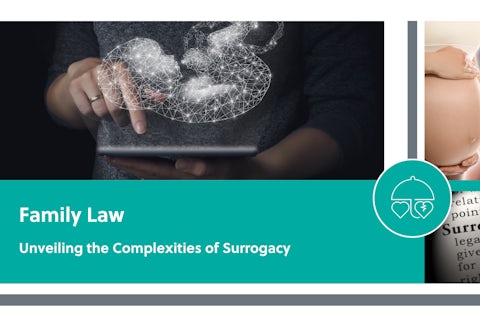In May of this year, a consultation paper was launched for the purpose of reviewing child law in Scotland. Submissions close on 7 August. In the lead up to that Shona Young and I will be looking at some of the key aspects of the consultation paper.
Today’s blog will deal with the topic of whether all fathers should automatically have parental rights and responsibilities (PRRs) in respect of a child.
If an individual has PRRs in respect of a child, that individual will be entitled to have contact with the child, and to be involved in and make major decisions in respect of the child’s welfare including where they go to school, medical treatment and the like. The acquisition of PRRs therefore has significant ramifications.
The starting point is to consider how PRRs are currently obtained by fathers. There are two aspects to this – automatic PRRs; and PRRs obtained by way of agreement or Court Order.
At present, a father will automatically obtain PRRs in respect of a child where: –
- At the time of the child’s birth or subsequently, he is married to the child’s mother; or
- Provided the child was born after 4 May 2006, if the father is named on the birth certificate.
Where a father has not automatically obtained PRRs, they can be obtained by way of a formal agreement with the child’s mother, or by application to a Court. If an application is made to a Court, the father will require to persuade the Court (potentially in face of opposition from the child’s mother) that it is in the best interests of the child that PRRs be granted.
Put shortly, the effect of the law as it presently stands is that a mother can register the birth of a child on her own and exclude the father from the birth certificate. The father cannot do likewise. If the parents of a child are not married, it is therefore within the control of the child’s mother to prevent the father having automatic PRRs thereby necessitating that he subsequently persuades the mother to bestow them by way of written Agreement, or makes an application to the Court.
The gut response to the proposition that all fathers ought to have PRRs might be that it is something of a “no brainer” – after all, all mothers automatically have PRRs. As far back as 1992, at a time when fathers only automatically obtained PRRs if they were married, the Scottish Law Commission argued that an unmarried father may be as motivated to care for and protect a child as a married father, or indeed the mother of the child – the logic was that if a father automatically obtains PRRs and that father’s involvement is contrary to the child’s welfare, then a Court can remove or regulate PRRs, putting him in the same position as the child’s mother.
In 2006, when the Scottish Parliament was considering whether unmarried fathers should obtain automatic PRRs, the proposition that this should apply to all fathers was rejected. It was felt that it would not be fair if women who suffered trauma such as rape, or had become pregnant through a casual liaison, then had to go to Court to have PRRs removed from the father. Ultimately, the changes to the law which came into force on 4 May 2006 as noted above gave unmarried fathers automatic PRRs only if they were on the birth certificate, the logic being that by jointly registering a birth this showed a joint commitment to parenting which should be demonstrated before the father obtained PRRs.
These are difficult issues. Whilst the point in terms of victims of rape and sexual assault is hopefully a rarity, one can absolutely see why, in those circumstances, it would be wholly inappropriate for the father to automatically obtain PRRs.
On the issue of “casual liaisons” however, we regularly see fathers in these circumstances who are devoted to the child and to being a positive and caring influence in their lives, but whom by virtue of not being named on the birth certificate require to seek PRRs in respect of a child that they are committed to by agreement or from the Court. I think it is also important to acknowledge that the impact of the law as presently drafted extends beyond these specific circumstances. For example, if a couple were unmarried and had been together for years, made a joint decision to have a child and then separated before birth it would be within the control of the mother to deprive the father of automatic PRRs.
One possibility considered by the consultation paper is making joint birth registration a legal requirement. Going forward all fathers would therefore in practical terms have automatic PRRs (providing of course that the child was born after 4 May 2006) by virtue of having to be named on the birth certificate. The same issues highlighted above have been acknowledged in the consultation paper – the risk is that perpetrators of domestic abuse or sexual assault are then listed on a birth certificate which under the current law would give them automatic PRRs.
To get around this problem, the consultation paper considers compulsory joint registration with some allowed exceptions such as where it is impossible to identify who the father is; where the father’s whereabouts are unknown; or there are unreasonable circumstances. At first blush that would seem a practical compromise. However, it would not be without its issues. Whilst one can assume that a child being conceived as a result of sexual assault would fall within the definition of an “unreasonable circumstance” there would clearly need to be some clear guidelines – would the father wishing to have no involvement in the child’s life also be an “unreasonable circumstance”? A system such as this would also leave the victim of rape having to explain why no father was being listed on the birth certificate, potentially leading to further trauma. There is also the issue of who would police such a system – for example, what if the mother is lying when she says that the father cannot be identified or found.
It will certainly be interesting to see what conclusions, in due course, are reached on a reform of automatic PRRs for fathers. Whilst one can see the desire for parity between the parents of a child, what is clear from the difficulties highlighted in the consultation paper is that finding a better answer to the system presently in place will not be without difficulty.
The information and opinions contained in this blog are for information only. They are not intended to constitute advice and should not be relied upon or considered as a replacement for advice. Before acting on any of the information contained in this blog, please seek specific advice from Gilson Gray.








